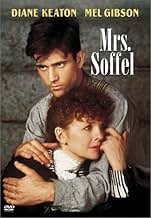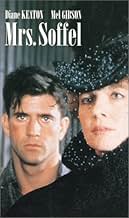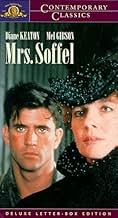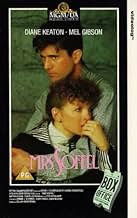NOTE IMDb
6,1/10
3,8 k
MA NOTE
Ajouter une intrigue dans votre langueDiane Keaton stars as a prison warden's wife who falls in love with a death row convict (Mel Gibson.) Believing he's innocent, she helps him and his convicted brother escape.Diane Keaton stars as a prison warden's wife who falls in love with a death row convict (Mel Gibson.) Believing he's innocent, she helps him and his convicted brother escape.Diane Keaton stars as a prison warden's wife who falls in love with a death row convict (Mel Gibson.) Believing he's innocent, she helps him and his convicted brother escape.
- Réalisation
- Scénario
- Casting principal
- Récompenses
- 3 nominations au total
Jennifer Dundas
- Margaret Soffel
- (as Jennie Dundas)
Avis à la une
Mel Gibson's performance in "Mrs. Soffel" is superb in any event, but viewed in the context that it is the first time he played an American character on film, that his brother was played by American actor Matthew Modine, and that the film was based on a true story of two men from Pittsburgh, it is an even greater achievement.
(1984) Mrs. Soffel
DRAMA/ SOCIAL COMMENTARY
Starring Mel Gibson as prisoner, Ed Biddle and Diane Keaton as Kate Soffel that was supposedly based on fact. That happened in 1901 centering on those two characters unusual love affair. 'The Biddle Brothers' of Ed (Mel Gibson) and his brother, Jack (Mathew Modine) are sentenced to death because of another former criminal's testimony, which this guy claims he saw the brothers shoot and kill a defenseless store clerk. Except that these claims are made by a convict who already has a criminal record. And since out of the many robberies the Biddle Brothers had done together, their had never been a recorded incident where someone had been killed as a result of those robberies, so it's more probable than not that it had never happened. Anyways, Mrs. Soffel is married to the warden of this particular prison where all she does is hand out bibles and blankets to all the inmates. At first, she doesn't believe Ed (Gibson) when he tells her that him and his brother are innocent in regarding a clerk's death, but as a result of putting one her daughters into bed, her daughter informs her as a result of saving newspaper clippings that it's more probable than impossible that 'the brothers' may be innocent. Ed then strike up an emotional attraction with Mrs. Soffel since she's not getting any from her impotent husband anymore, which her marriage seems to be lifeless. As viewers witness they sleep in separate rooms and act like husband and wife in principal only. And it was during that time, she of course does her best to prevent this death penalty to occur. Although, I liked both Mel Gibson and Diane Keaton's performances, the story structure is somewhat dull and predictable. For it was obvious the film is clearly arguing against the death penalty, solely for this reason is that the accused might be innocent. And this message was mentioned like in the first half hour before it drags and prolongs the movie by showcasing the two characters of Keaton and Gibson becoming intimate with one another, something one can get from a Harlequin novel. And that is boring which forced me to use the fast forward button on many scenes while playing.
Starring Mel Gibson as prisoner, Ed Biddle and Diane Keaton as Kate Soffel that was supposedly based on fact. That happened in 1901 centering on those two characters unusual love affair. 'The Biddle Brothers' of Ed (Mel Gibson) and his brother, Jack (Mathew Modine) are sentenced to death because of another former criminal's testimony, which this guy claims he saw the brothers shoot and kill a defenseless store clerk. Except that these claims are made by a convict who already has a criminal record. And since out of the many robberies the Biddle Brothers had done together, their had never been a recorded incident where someone had been killed as a result of those robberies, so it's more probable than not that it had never happened. Anyways, Mrs. Soffel is married to the warden of this particular prison where all she does is hand out bibles and blankets to all the inmates. At first, she doesn't believe Ed (Gibson) when he tells her that him and his brother are innocent in regarding a clerk's death, but as a result of putting one her daughters into bed, her daughter informs her as a result of saving newspaper clippings that it's more probable than impossible that 'the brothers' may be innocent. Ed then strike up an emotional attraction with Mrs. Soffel since she's not getting any from her impotent husband anymore, which her marriage seems to be lifeless. As viewers witness they sleep in separate rooms and act like husband and wife in principal only. And it was during that time, she of course does her best to prevent this death penalty to occur. Although, I liked both Mel Gibson and Diane Keaton's performances, the story structure is somewhat dull and predictable. For it was obvious the film is clearly arguing against the death penalty, solely for this reason is that the accused might be innocent. And this message was mentioned like in the first half hour before it drags and prolongs the movie by showcasing the two characters of Keaton and Gibson becoming intimate with one another, something one can get from a Harlequin novel. And that is boring which forced me to use the fast forward button on many scenes while playing.
This is a visually beautiful movie bringing the story along in with obvious and subtle references.
The title character is a trapped woman. The 'noblesse oblige'of being the warden's wife coupled with her own frustrations and frailties makes her life intolerable. She loves her children; she hates her life.
Here, she becomes intrigued by a prisoner in her husband's jail. He appeals to her imagination as well as her sensibility as a woman. She finds a soul-mate in their exchanges as she pretends to read-him-to-reform from bible passages. She flees with him and is willing to die with him to keep from returning to her unbearable life.
This is based on a true story. But it is a telling of the story of women, most of whom until the last 25 years or so, had little choice but to marry and to identify themselves in terms of their husbands. Their identity was not their own; their choices had to be appropriate to their marriage station; they were judged by how well they maintained husband's well being and their children's achievements.
While much has changed in women's lives, vestiges of the past still do exist. The references to "baking cookies" in the 2004 presidential campaign signals this.
Mrs. Soffel represents the lives of women over time. She desperately seeks the love and freedom that her standing in life denies her. This has been a common women's theme.
The title character is a trapped woman. The 'noblesse oblige'of being the warden's wife coupled with her own frustrations and frailties makes her life intolerable. She loves her children; she hates her life.
Here, she becomes intrigued by a prisoner in her husband's jail. He appeals to her imagination as well as her sensibility as a woman. She finds a soul-mate in their exchanges as she pretends to read-him-to-reform from bible passages. She flees with him and is willing to die with him to keep from returning to her unbearable life.
This is based on a true story. But it is a telling of the story of women, most of whom until the last 25 years or so, had little choice but to marry and to identify themselves in terms of their husbands. Their identity was not their own; their choices had to be appropriate to their marriage station; they were judged by how well they maintained husband's well being and their children's achievements.
While much has changed in women's lives, vestiges of the past still do exist. The references to "baking cookies" in the 2004 presidential campaign signals this.
Mrs. Soffel represents the lives of women over time. She desperately seeks the love and freedom that her standing in life denies her. This has been a common women's theme.
I skimmed the other comments before writing this one in case I'd missed something, but I think my initial lukewarm reaction to the film, which I saw on Turner Classic Movies, is the one I'll stick with.
I tuned into this movie because of Mel Gibson and also because I also happen to like Matthew Modine and Edward Hermann.
One commenter said something about the director liking strong female characters, but I didn't see Mrs. Soffel as being strong. Yes, she was unfortunate to be born at a time when women were basically seen as appendages to men. Her husband was not terribly understanding. As the movie opens, she is ill. Then she seems to undergo a miraculous recovery after being bedridden for months. My interpretation of this is that she had probably been suffering from a depressive episode. Yes, Mrs. Soffel is weak. Instead of doing something positive to stir her out of her situation, she falls prey to a criminal, who, admittedly, may not have been all bad. I suppose she had formed some sort of romantic image of Ed Biddle. And perhaps he also had a romantic streak. Both characters are shown to be not at all realistic in the way they see life.
I also found the film rather slow-moving, especially at the beginning. I almost stopped watching. Overall I found, though there were some touching emotional moments, especially at the end, that the movie lacked much of a plot and the characters lacked depth. With such a weak script, I think it would be difficult for me to see much for the actors to have worked with and cannot praise their performances. I wouldn't consider the movie to have been a complete waste of my time, but I couldn't really recommend it.
I tuned into this movie because of Mel Gibson and also because I also happen to like Matthew Modine and Edward Hermann.
One commenter said something about the director liking strong female characters, but I didn't see Mrs. Soffel as being strong. Yes, she was unfortunate to be born at a time when women were basically seen as appendages to men. Her husband was not terribly understanding. As the movie opens, she is ill. Then she seems to undergo a miraculous recovery after being bedridden for months. My interpretation of this is that she had probably been suffering from a depressive episode. Yes, Mrs. Soffel is weak. Instead of doing something positive to stir her out of her situation, she falls prey to a criminal, who, admittedly, may not have been all bad. I suppose she had formed some sort of romantic image of Ed Biddle. And perhaps he also had a romantic streak. Both characters are shown to be not at all realistic in the way they see life.
I also found the film rather slow-moving, especially at the beginning. I almost stopped watching. Overall I found, though there were some touching emotional moments, especially at the end, that the movie lacked much of a plot and the characters lacked depth. With such a weak script, I think it would be difficult for me to see much for the actors to have worked with and cannot praise their performances. I wouldn't consider the movie to have been a complete waste of my time, but I couldn't really recommend it.
It's 1901 Pittsburgh. Kate Soffel (Diane Keaton) is the wife of prison warden Peter Soffel (Edward Herrmann). Ed Biddle (Mel Gibson) and Jack Biddle (Matthew Modine) are brothers on death row for murder although they claim to be innocent. Kate befriends Ed. It grows into a romance and she helps them escape.
This is based on a true story. It doesn't always make it compelling. I can do with a lot less of the courting in the first half. It is terribly boring and terribly long. It takes an hour before they escape. The escape and the fugitive stages have a bit more tension which this movie sorely needs. As for the romance, it's hard to know Ed's true feelings until they become fugitives on the run. Keaton and Gibson do try to generate some heat at that point. It's a 50-50 proposition. It feels more like a romance novel. The most compelling scenes happen in the last five minutes. It is a very long slough to get there.
This is based on a true story. It doesn't always make it compelling. I can do with a lot less of the courting in the first half. It is terribly boring and terribly long. It takes an hour before they escape. The escape and the fugitive stages have a bit more tension which this movie sorely needs. As for the romance, it's hard to know Ed's true feelings until they become fugitives on the run. Keaton and Gibson do try to generate some heat at that point. It's a 50-50 proposition. It feels more like a romance novel. The most compelling scenes happen in the last five minutes. It is a very long slough to get there.
Le saviez-vous
- AnecdotesThe jail used in the movie is the actual Allegheny County Jail that figures in the story. Designed by noted architect Henry Hobson Richardson, built between 1884-1888, it served as a jail until 1995 and is now used by the juvenile and family sections of the Common Pleas Court.
- GaffesA toy electric train shown running around a Christmas tree is of a post-1950 design, as is the track. The train is based on 19th-century locomotive and passenger car prototypes, making it more plausible. However, toy electric trains that even remotely resembled the one shown did not exist by 1901.
- Citations
Kate Soffel: Don't you let them take me alive, Ed. Promise me. Promise me, Ed.
Ed Biddle: I won't, I promise. I won't let them take you.
- ConnexionsFeatured in The Making of 'Mrs. Soffel' (1984)
Meilleurs choix
Connectez-vous pour évaluer et suivre la liste de favoris afin de recevoir des recommandations personnalisées
Détails
Box-office
- Budget
- 11 000 000 $US (estimé)
- Montant brut aux États-Unis et au Canada
- 4 385 312 $US
- Week-end de sortie aux États-Unis et au Canada
- 86 280 $US
- 1 janv. 1985
- Montant brut mondial
- 4 385 312 $US
- Durée
- 1h 50min(110 min)
- Mixage
- Rapport de forme
- 1.85 : 1
Contribuer à cette page
Suggérer une modification ou ajouter du contenu manquant





































